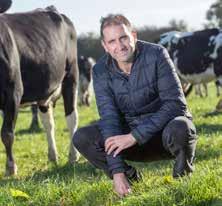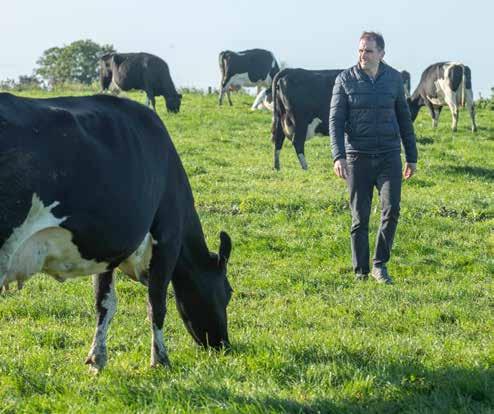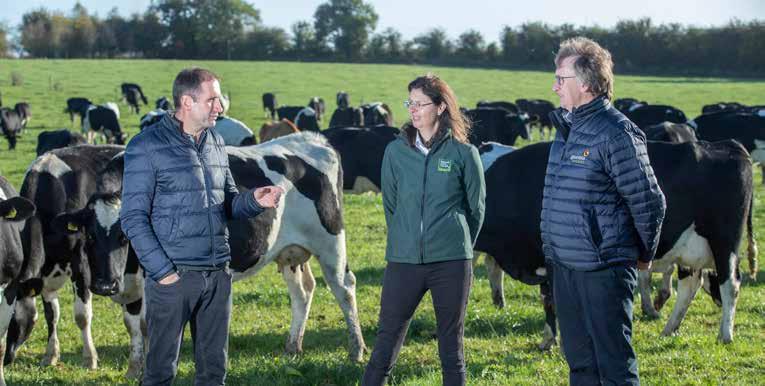
3 minute read
Farmer in Focus
Third-generation dairy farmer putting sustainability at the heart of his family farm
Shane O’Loughlin,
Co. Kildare
Dairy farmer Shane O’Loughlin Picture Credit: Finbarr O’Rourke
Shane O’Loughlin For Shane O’Loughlin, reducing farm emissions and safeguarding biodiversity goes hand in hand with maintaining a sustainable farm.
Like thousands of Ireland’s dairy farmers, Shane O’Loughlin comes from a proud farming tradition. His family have been farming at Oghill, Co. Kildare, since 1943 when Shane’s grandfather first bought the land. The family have been dairy farming since 1960 when a dairy co-op was established in Monasterevin. Following the completion of a first-class honours degree in Animal Crop Production in UCD and time abroad, Shane returned to the farm in 2005, taking over full management from his father in 2011. He and his wife Judith have three children, Hugh, Tom and Emma. Since taking over the farm, Shane has worked hard to reduce the carbon footprint associated with his farm’s milk production, putting in place a series of initiatives which have improved grass quality, soil fertility, animal breeding, as well as improving biodiversity on his land.


Shane O’Loughlin with Zoe Kavanagh, Spokesperson European Milk Forum and CEO National Dairy Council, John Murphy, Chairman, Glanbia Ireland. Picture Credit: Finbarr O’Rourke
Sustainability in action
Nutrient Management Planning The farm has a nutrient management plan in place which provides precise information on what levels of nutrients are in the soil. Shane samples 25% of his farm soil annually. Following this rotation over a four-year cycle provides a good indicator of the quality of the soil, what areas need attention and corrective action and what areas need conservation and management. As a result of this, he can tailor the application of fertiliser and slurry to ensure that fields have the correct balance of potassium, phosphorus and nitrogen. Low emissions slurry spreading Shane has his own low emissions slurry spreading equipment and a trailing shoe. By using this and other techniques, he has increased the percentage of slurry spread in spring to 30% and hopes to build upon this further.
Grassland management Shane’s cows are in the fields for over 300 days each year. By having his herd out on grass for almost 10 months of the year, Shane saves on feeding his animals expensive silage and grain, as well as improving overall herd health as the animals can graze in the open space and fresh air. Biodiversity Shane’s farm is part of the Protecting Pollinators European Partnership Innovation programme, managed through the National Biodiversity Data Centre. Shane has set aside 10 acres of the farm for conservation and biodiversity with a dedicated area for native Irish trees, hedgerows, flora and fauna, providing a perfect habitat for birds, bees, bats and other wildlife. The farm has a network of hedgerows which provide both cover and shelter for animals, helping to regulate water flow and support carbon sequestration. Hedgerow cutting is on a 3–5year rotation, rather than annually. Economic Breeding Index Shane has put a big emphasis on improving the Economic Breeding Index (EBI) of his herd and it has been an important factor in helping to reduce the carbon footprint of the milk produced on the farm. The EBI system involves farmers selecting the most profitable animals for breeding dairy herd replacements, assessing animals on a number of criteria such as milk production capacity, fertility, calving performance and management and health. Carbon footprint As a result of these and many other actions, the carbon footprint associated with every litre of milk on the O’Loughlin farm has reduced by 6% according to his 2020 Bord Bia Sustainability Dairy Assurance Scheme report. The scheme assesses a farmer’s milk production process to ensure it meets Bord Bia standards, taking account of animal welfare, environmental protection and food safety. Representatives from the European Milk Forum, the National Dairy Council and Glanbia Ireland recently joined Shane for a farm walk to see the sustainability initiatives implemented on the farm and to discuss the response of the dairy sector to climate change and the changing needs of consumers. The event is available to view at GlanbiaConnect.com/ news/LivingProofEvent





